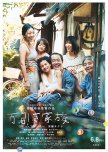Will ‘ Shoplifters’ Steal Your Heart?
Hirokazu Kore-eda’s films have long been held as masterful arts of work in themselves; profound, complex and subtly crafted-something that ‘ Shoplifters’ presented beautifully throughout its storyline.
Lily Franky takes on the role of Osamu; the head of the band-wagon group of rouges seemingly appear as a middle-aged husband alongside his middle-aged wife Shibata Nobuyu ( Ando Sakura), their two children teenager Shibata Aki ( Matsuoka Mayu) and their young son Shibata Shiota ( Jyutu Kairi) and granny Shibata Hatsue ( Kiki Kirin). However the house is filled with untold truths and secrets; Osamu gaining most of his profit from shoplifting by enlisting the help of Shiota, Nobuyu stealing things from clothes’ pockets during her laundry job, Aki being part of a peep show in order to make ends meet and Hatsue’s seperate past life and gambling addiction at the local pachinko machines in secret. Yet the family find themselves ineffably stuck in a rut when they come across Juri ( Sasaki Miyu); an abandoned and abused little girl who is quick to warm their hearts but with undeniable consequences towards their future.
The casting choices of the move were undeniably brilliant with each actor feeling masterfully placed like pieces on a chessboard by Kore-eda. Yet admittedly one of the most dynamic of the movie came through Kiki Kirin’s role as Shibata Hatsue; sadly her last role before her passing shortly afterwards.
It should come as no surprise rust Kore-da’s unlikely Palmes D’Or winner offered viewers a sociopolitical depiction upon the deep-rooted trauma of a family united under one roof, alongside the fear of poverty. The narrative of the film took no wasted-time with subtly painting the dysfunctions of modern Japanese society and hypocrisies as well as the audacious details of characters and how they’d e linked together.
Yet against the beauty of the film’s narrative there was an admitted flaw with ‘ Shoplifters’ and that came through the initial problem of pacing. The film is admittedly slow-burn and whilst necessary for building up the storyline as well as delivering its twist-ending, lacked a greater sense of momentum towards the plot and attention of viewers.
Nevertheless Ryûto Kondô’s cinematography highlights a stark depiction of more grounded issues of the film such as child abduction, abuse and abandonment against the surrealist fantasy -world of Kore-eda’s microcosm of a seemingly mysterious family. The OST is admittedly less memorable than other parts of the film but Kore-eda’s placed emphasis on visual aesthetics other auditory became evident in the final act of the film beautifully encased in snow; a final flurried blur between the fairytale and childlike world of the family’s insular bubble and the cold and harsh reality of the events that are unfolding also.
Kore-eda’s ‘ Shoplifters’ is undeniably a heartwarming, bittersweet and audacious film about family. The subtle narrative and character-build was masterfully depicted alongside the strong performances by the cast. Admittedly whilst the film could sometimes hit a rut with pacing, the movie’s themes and finale offered viewers with a deeply thoughtful and contemplative film.
Esta resenha foi útil para você?























